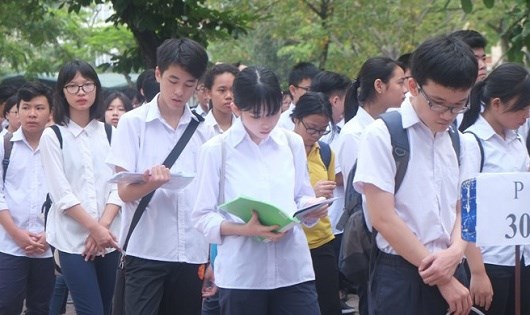VietNamNet Bridge – While the Ministry of Education and Training (MOET) reports that students’ performance has improved considerably, many teachers and parents doubt the figures.

The majority of secondary and high school students are “good” and “excellent” students, while nearly 100 percent of primary schools get a ‘pass’ and there are only a few students with low marks.
A primary school teacher in Hanoi said that she mostly gives good marks of 9-10 to students’ school works, while the 5-6-7 marks are rarely seen.
However, the high proportion of good and excellent students cannot convince experts and parents that Vietnamese students have high quality.
Nguyen Dinh Anh, former senior official of the Nghe An provincial education department, said if assessing students with stricter standards, the number of students at an average and above level accounts for only 60 percent.
“The proportion of good and excellent students reported by MOET is not substantive. The quality of students must be assessed based on two factors – good theoretical knowledge and good practice,” he said.
General school teachers themselves think that the reported percentage of good students is ‘abnormally high’ which doesn’t truly reflect the real situation.
Van Nhu Cuong, headmaster of Luong The Vinh High School, said he was surprised when nearly all secondary school graduates who applied for his schools got 9-10 marks in literature and math.
Le Thong Nhat, general director of BigSchool, commented that there are many reports about achievements gained by the Vietnamese educational sector, but the views are quite different.
Nguyen Thi Huyen Thao, a history teacher at Tran Dai Nghia Secondary School, thinks that various parties have different views about quality and education goals.
This is also why views about the application of VNEN in Vietnam are different. The World Bank report shows that most Vietnamese parents advocate a school organized model, while in fact parents in many provinces showed strong opposition to the decision to apply the model in their localities.
“I like VNEN because the model aims to develop cognitive skills, while parents oppose VNEN because they fear their children will receive bad exam marks,” she said.
A high school teacher in Hanoi also commented that Vietnamese students study to pass the exam, and obtaining more knowledge and practicing of skills is not their optimal goal.
“All students try to learn to pass the entrance exams to university,” he explained.
“Therefore, it is necessary to renovate the exam scheme to truly assess students’ abilities,” he said, adding that the ability of every person needs to be assessed in many fields rather than the capability of solving exam questions.
More students attending vocational school instead of university
The Hanoi student who loves mathematics
Thanh Mai